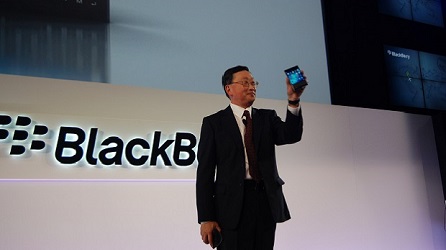When John Chen took over as executive chair and CEO of financially-troubled BlackBerry exactly a year ago, he decided the company had to focus more on serving enterprise customers.
Today, the company released the latest version of its BES server, new features aimed at enterprises and a marketing campaign that hammers the message that BlackBerry solutions make enterprise communications secure.
Chen also warned mobile and enterprise device management competitors that he says made fun of BlackBerry’s falling sales a year ago that his company is coming back.
“Today my advice to them is I’m ending their party,” he told analysts and reporters in San Francisco. “We are not only a point product, not only an MDM solution provider, we’re an EMM solution provider – very broad, very deep, and they need to understand that. So they’re going to have to work for their living rather than have fun on us.”
As evidence of its willingness to fight back for market share the company announced a partnership with a handset maker and new applications for bringing in more revenue. These include:
- a partnership with Samsung Electronics, which early next year will see BES 12 include the ability to manage its Android-based Galaxy handsets and tablets with Samsung’s Knox security features. BES already lets administrators oversee Apple iOS and Android devices. With this partnership Samsung hopes BES enterprises will favour its devices if they allow staff to use Android units. Knox is a container solution that manages and secures business data and protects the OS kernel from attack. Samsung also sells a cloud-based mobile device management service. As part of the pact Samsung will resell BES 12 to joint enterprise customers, and BlackBerry will offer Knox as part of the Gold family of BES12 subscriptions. Pricing was not announced.
- Enterprise Identity for BES12, for managing enterprise-approved cloud services. Staff will only need a single sign on to access any cloud application. When released next month it uses open standards and will come with a number of pre-federated services;
- VPN Authentication, which will allow BlackBerry, iOS and Android devices managed under BES12 to user their devices alone for two-factor authentication. As a result users won’t have to carry key fobs that generate digits needed for extra authentication to log into secure web sites. It leverages a staffer’s existing corporate credentials for logging into a notebook/desktop computer, then sends a request to confirm ID on the company managed mobile device. The company authentication server stays on premise and not in cloud. Pricing starts at US$3 a user.
- WorkLife, which allows enterprises to add a second phone line to BES12 managed devices so staff can have one for personal use and the other for corporate use and billing for voice, SMS and data. Uses can easily toggle between the two, BlackBerry says, by touching a suitcase (work) or football (personal) icon. The idea is to make corporate telecom billing easier;
- BlackBerry is trying to monetize its popular BBM messaging service and has already announced services such as BBM Protected. Soon there will another: BBM Meetings, which will allow BlackBerry, iOS or Android BMM users to turn any chat into a collaborative session. The service links to device contacts and calendars.
Users will be able to schedule, start a meeting or join a meeting in progress, mute participants or kick someone out. Through Autojoin, a person can be included in a meeting by answering the phone. The idea is to make online meetings on a mobile device as easy as it is on a desktop. Not only is there a Meetings app for mobile devices, there are also ones for Windows and Mac desktop computers.
“We believe BBM Meetings will dramatically change the way people collaborate from a mobile-first perspective,” said Jeff Gadway, BlackBerry’s director of product marketing.
Separately, the company said BBM Protected will also be available for managed Android and iOS devices.





